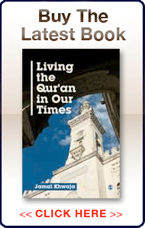Home | Contact | Bio | Interview | Essays | Latest Books | Past Books | Buy Books
Academic Bio-Data: Professor Jamal Khwaja
Jamal Khwaja (b. 1928) was educated at Allahabad, Aligarh and Christs’ College, Cambridge. Appointed Lecturer at Aligarh Muslim University, Aligarh, in 1953, young Khwaja’s passionate admiration for Jawahar Lal Nehru led him into a short spell of politics as an elected Member of Parliament (Lok Sabha) from 1957 to 1962. But he soon withdrew and has ever since remained aloof from politics.
Khwaja’s philosophical work has two facets: an analysis of the nature and causes of philosophical disagreement, and second, analysis of the religious dimension of life, with special reference to Islam. His first work, Five Approaches to Philosophy, dealt with the first theme, while his second, and hitherto, principal work, Quest for Islam, with the other.
Khwaja’s basic approach to philosophy and religion is irenic rather than polemical, and he attempts to transcend the traditional polarities of Rationalism and Empiricism, Idealism and Materialism, Theism and Atheism. This irenic approach flows from a critical methodology of philosophy.
General Accomplishments:
-
❖Head of the Department of Philosophy, Aligarh Muslim University, Aligarh, 1978-84.
-
❖Dean, Faculty of Arts and Ex-Officio Member of the Executive Council, Aligarh Muslim University, Aligarh, 1980-82.
-
❖Member of Parliament (Lok Sabha), 1957-62.
-
❖Member, Central Advisory Board of Anthropology, 1959-62.
-
❖Leader of the Govt. of India Cultural Delegation to Afghanistan, 1960.
-
❖Jt. Secretary, Hindustani Culture Society, founded by Pt. Sunder Lal, Tej Bahadur Sapru, A. M. Khwaja et al., 1964-69.
-
❖Member, University Grants Commission Panel on Philosophy and of Visiting Committee to Bombay University, 1978-82.
-
❖Member of the Governing Body of the Indian Council for Philosophical Research, New Delhi, 1984.
-
❖Governor’s Nominee on the Senate of Himachal University, Shimla.
-
❖Member, Editorial Board, Indian Philosophical Quarterly, Poona.
-
❖Delivered the Schopenhauer Centenary Lecture at Max Mueller Bhawan, New Delhi, 1959-60.
-
❖Member, Government of India Delegation to the International Islamic Conference, Kuala Lumpur, 1969.
-
❖Director, Philosophical Dialogue between Ulema and Modern Scholars, sponsored by Indian Council for Philosophical Research, New Delhi, 1988.
Published Works: Books
-
❖Living The Quran In Our Times:
A vision of how Muslims can revitalize their faith, while being faithful to God and His messenger -
❖The Call of Modernity And Islam:
A Muslim’s Journey Into The 21st Century -
❖The Vision of An Unknown Indian Muslim:
My Journey To Interfaith Spirituality -
❖Essays On Cultural Pluralism:
A Philosophical Framework For Authentic Interfaith Dialogue -
❖Quest For Islam:
A Philosopher’s Approach To Religion In The Age Of Science And Cultural Pluralism -
❖Authenticity And Islamic Liberalism:
A Mature Vision Of Islamic Liberalism Grounded In The Quran -
❖Five Approaches To Philosophy:
A Discerning Philosopher Philosophizes About The Philosophy Of Philosophy With Wisdom and Clarity -
❖Readings from Gandhi (Jointly ed. With Alvi), Aligarh Muslim University, Aligarh, 1969.
-
❖The Islamic Vision of Sir Syed (in Urdu) Ed., New Aligarh Movement, Aligarh, 1988.
Academic Papers
-
❖What is Modernity? Proceedings of the Indian Institute of Advanced Study (I.A.A.S.), Simla, 1968.
-
❖Science and Religion, I.A.A.S., Simla, 1970.
-
❖Modernity and Traditionalism in Islam, I.A.A.S., Simla 1971.
-
❖Is the Mixed Economy a Dialectical Synthesis of Capitalism and Socialism, (Indira Gandhi Felicitation Volume), 1975.
-
❖Religion and Conceptual Evolution, Proceedings of Seminar on Philosophy of Culture, Chandigarh, 1966.
-
❖Review Article on I. Berlin’s Vico and Herder, Aligarh journal of English Studies, 1976.
-
❖Iqbal’s Conception of God, Iqbal Commemoration Volume, Ghalib Academy, New Delhi, 1978.
-
❖The Religious Weltanschauung of Mohammad Ali, Islam and the Modern Age, (Quarterly), Delhi, 1980.
-
❖Is Islam a Total Code of Conduct? Proceedings of the Iqbal Institute, Srinagar.
-
❖The Religious Revolution in the 18th Century and Islam, Islam and the Modern Age (Quarterly), New Delhi, February 1983.
-
❖History – Theory, Philosophy and Wisdom, Man and Development (Quarterly), June 1983.
-
❖The Concept and Role of Tolerance in Indian Culture, Proceedings of Seminar, Center of Advance Study in Philosophy, Madras, 1985.
-
❖Truth and Knowledge, Professor S.N. Murty Commemoration Volume, 1985.
Work Hitherto Unpublished
-
❖The Linguistic Approach to the Problem of Perception.
-
❖Fine Art as a Value.
-
❖The Ethical Argument for Socialism.























